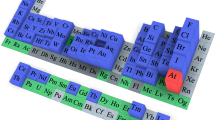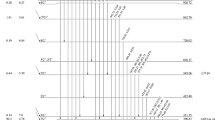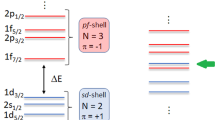Abstract
IT was shown by Fermi and co-workers1 that the activity induced in iron by neutron bombardment is due to an isotope of manganese. The isolation of an active iron isotope has not been reported. By means of the sensitive tube counter outfit2 in this institute, it was found that active iron can be isolated from cobalt which has been irradiated with neutrons, whereas irradiated iron after removal of manganese was found to be inactive.
This is a preview of subscription content, access via your institution
Access options
Subscribe to this journal
Receive 51 print issues and online access
$199.00 per year
only $3.90 per issue
Buy this article
- Purchase on Springer Link
- Instant access to full article PDF
Prices may be subject to local taxes which are calculated during checkout
Similar content being viewed by others
References
Fermi and co-workers Proc. Roy. Soc, A, 146, 483 (1934).
Buch Andersen Z. Phys., 93, 597 (1936).
de Gier and Zeeman, Proc. Roy. Acad. Sci. Amsterdam, 38, 959 (1935).
Author information
Authors and Affiliations
Rights and permissions
About this article
Cite this article
ANDERSEN, E. A Radioactive Isotope of Iron. Nature 138, 76–77 (1936). https://doi.org/10.1038/138076b0
Issue Date:
DOI: https://doi.org/10.1038/138076b0
Comments
By submitting a comment you agree to abide by our Terms and Community Guidelines. If you find something abusive or that does not comply with our terms or guidelines please flag it as inappropriate.



